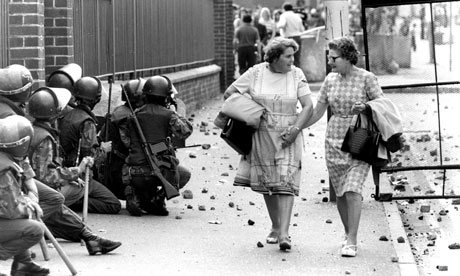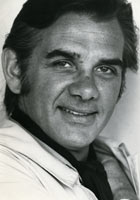News and portrait photographer with an eye for the unexpected and the authentic

Conversation Piece, a photograph taken in Belfast in 1977 by Michael Ward
Michael Ward, who has died after a long illness, aged 82, was a news photographer for almost 40 years and once calculated that his archive of prints and negatives covered 5,500 assignments, mainly though not exclusively for the Sunday Times. And yet he came late to his career and never felt confident that he completely understood it. Towards the end of his life, after half a century with a camera, he wrote that he knew "as much or as little about the processes of photography as a decent amateur". Technically, he knew he was far from accomplished. Aesthetically, he was never sure what separated a good picture from an indifferent one. He had several exhibitions – the venues included the National theatre and the National Portrait Gallery – but he always remained suspicious about photography's claim as art. Nevertheless, many of his pictures are sympathetic and memorable. He had an eye for the unexpected and authentic, and as a portrait photographer he brought out the best in people; whatever their terror of the camera, few of Ward's subjects could resist his good looks and reckless, self-mocking charm. Performance was a family inheritance. Ward was born in Streatham, south London, to parents who were prominent on the West End stage. His father, Ronnie Ward, had equal billing with actors such as John Gielgud, Rex Harrison and Edith Evans (who became Michael's godmother). His mother, Peggy Willoughby, danced and sang in the chorus line of revues that starred Gertrude Lawrence, Jack Buchanan and Noël Coward. The marriage quickly became inconvenient to both partners, who were self-absorbed and serially adulterous (one of Ronnie's many conquests was Tallulah Bankhead) and in their son's words "quite spectacularly careless" as parents. Aged three, he was sent to a boarding school in Ealing which, like those that followed, did little for his education. He never lived in a settled family environment until his early middle age. 

Few of Ward's subjects could resist his good looks
Music became and remained a genuine passion. He won a piano scholarship and studied for three years at the Trinity College of Music in London, but decided he would never play well enough to make it his career. Acting seemed the obvious alternative. He joined the repertory theatre in Bromley and his looks began to win him small parts in films. He took Theo Ward as his professional name after his paternal grandfather, who was a musician and music-hall artiste, changing it subsequently to Lawrence Ward and, finally, to Rhett Ward. In 1952, the American director Bernard Vorhaus gave him a break in a film called Fanciulle di Lusso (The Finishing School), which was shot in Rome. It was his first and last star part, though he married his leading lady, Susan Stephen, and persevered on the fringes of the British cinema for the next half-dozen years, acquiring friendships and connections that later helped establish him as a photographer. His first published picture appeared in Women's Own magazine in 1958 and showed Stirling Moss's wife, Kate, watching the race in which her husband won the British grand prix – shot on a Rolleiflex that the poorly equipped Ward had borrowed from the driver. Freelance commissions followed and Ward began to work regularly for the Evening Standard's show-business pages. He joined the Sunday Times in 1965 and stayed with the paper until he retired 30 years later. He broadened his range to include news stories such as the Troubles in Northern Ireland, the Aberfan colliery disaster in south Wales and the Turkish invasion of Cyprus, as well as continuing with his portraits of musicians, visual artists, writers and actors – a tremendous variety stretching from Gary Cooper through Julie Christie to Hugh Grant. Any reporter who worked with him was always glad to hear his cheerful "Hello there, Number One", a nautical greeting that had been inspired by his brief appearance in the 1957 film Yangtse Incident. In fact, his only line (on the bridge of HMS Amethyst, shortly before it was blown up) turned out to be "Aye, aye, sir." Ward's abiding enthusiasms included elegant cars and powerful motorbikes. He owned several Rolls-Royces and taught his editor, Harold Evans, the best way to balance and ride a BMW. These were expensive hobbies to sustain on a staff photographer's salary, but Ward had a carefree approach to money. He was often in love and married five times: as a 19-year-old to a professor of music, Lettice Laird-Clowes; to Susan Stephen; to the model Fay Brooke; to Lisa Heseltine, with whom he had two daughters, Sam and Tasha; and finally, in 1976, to the actor and dancer Elizabeth Seal. In 2006 he published a courageous memoir, Mostly Women, which disclosed that as a teenager he had had an affair with his mother. In Ward's description, she was a "sexually voracious woman" and he had no idea how to resist. What had taken place in Willoughby's Soho flat over several weeks in 1945 remained a traumatic secret until Ward eventually confided the facts to his wife. "At first she was shocked," Ward wrote, "and then she gave me such love by saying it wasn't my fault; I became physically lighter." He saw his final marriage as a personal salvation. He is survived by Elizabeth, his daughters and six grandchildren. • Michael Ronald Ward, photographer, born 15 January 1929; died 17 April 2011
No comments:
Post a Comment